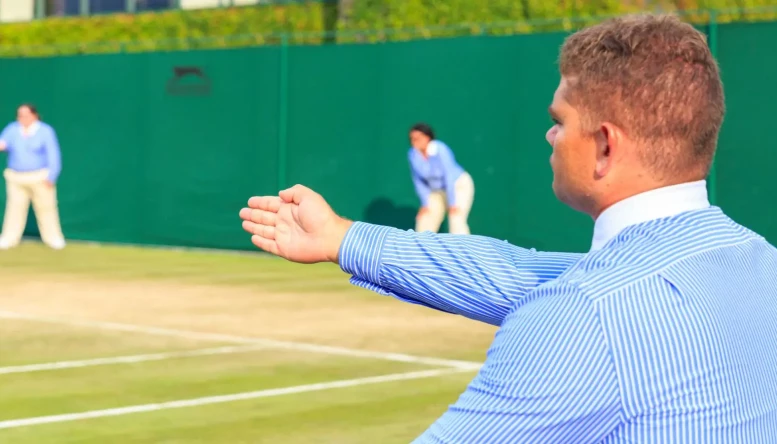Wimbledon boss responds to criticism following switch to electric line-calling
The likes of Jack Draper and Emma Raducanu criticised the decision to switch to electric line-calling, prompting a response from the Wimbledon director.
 Wimbledon line judge
Wimbledon line judgeAn iconic aspect of Wimbledon was removed for this year's tournament as line judges were replaced by an electronic system but players have argued it is not 100% accurate.
World No. 4 Draper was one of the first to criticise the move to the electronic system.
"I don't think it's 100% accurate in all honesty," he said in his post-match press conference after his loss to Marin Cilic. "A couple of the ones today, it showed a mark on the court. There's no way the chalk would have showed that. I guess it cannot be 100% accurate – it's millimetres."
His fellow Briton Emma Raducanu also criticised the move, again raising the subject of the system's accuracy.
"That call was for sure out," Raducanu said. "It's kind of disappointing, the tournament here, that the calls can be so wrong, but for the most part, they've been okay.
"It's just, like, I've had a few in my other matches, too, that have been very wrong. So yeah, I don't know. Hopefully, they can kind of fix that."
However, Wimbledon tournament director Jamie Baker insists that the use of electronic systems is universal across the tour and that the accuracy was acceptable.
"The concept of live line calling is absolutely standard across the Tour now – mandatory across the ATP Tour," he said, as per the Metro.
"Two of the other Grand Slams have had it for four or five years. What that has meant is that the level of sophistication and certification around the system has become more professional and more robust as time has gone on.
"The accuracy and the reliability and the robustness of the system and the process as a whole, in terms of officiating, is in as good a place as it has been."
Baker also said that the speed of the game meant that tennis was getting close to the "threshold" of being able to have human line judges.
"It doesn't work if nobody can call the lines, but we hadn't reached that threshold. But it was getting close. And so, again, that's us managing the risk.
"One thing I will say with the way that the technology has moved on, but also the number of cameras on each court, is that we're actually able to play a lot later than we had done in the past with the challenge system.
"Sometimes the players didn't like that, sometimes they did. But actually, we have a lot more time now that we can push matches out. But last night, it was getting close, but we hadn't quite reached that.
"It was more of a rounded decision where at some point, it's a top-level sport, playing at very high speeds, to be playing when it was that dark, the officials just didn't feel comfortable with it."
Editor's Picks
- 01
Brighton reject two offers for Joao Pedro amid Chelsea, Newcastle interest
- 02
England striker Dominic Calvert-Lewin to leave Everton on free transfer
- 03
Novak Djokovic admits Wimbledon could be his 'last dance' to win his 25th major title
- 04
India seamer Prasidh Krishna eager to improve ahead of second Test against England
- 05
Paul Pogba joins Monaco after end of doping ban in bid to revive career



